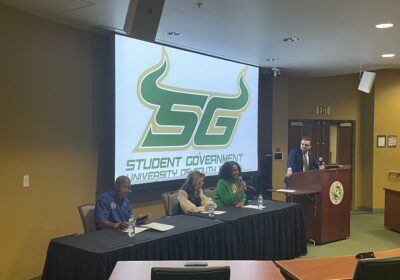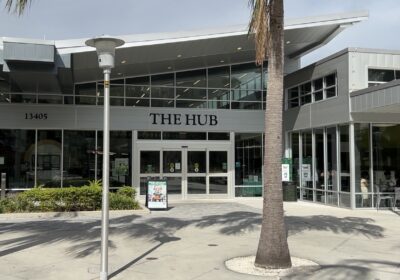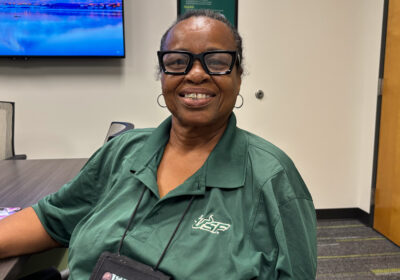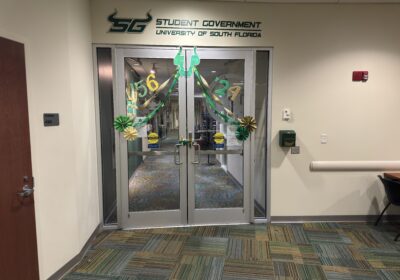Lowered vaccine age requirement has students enthusiastic about prospective return to in-person classes
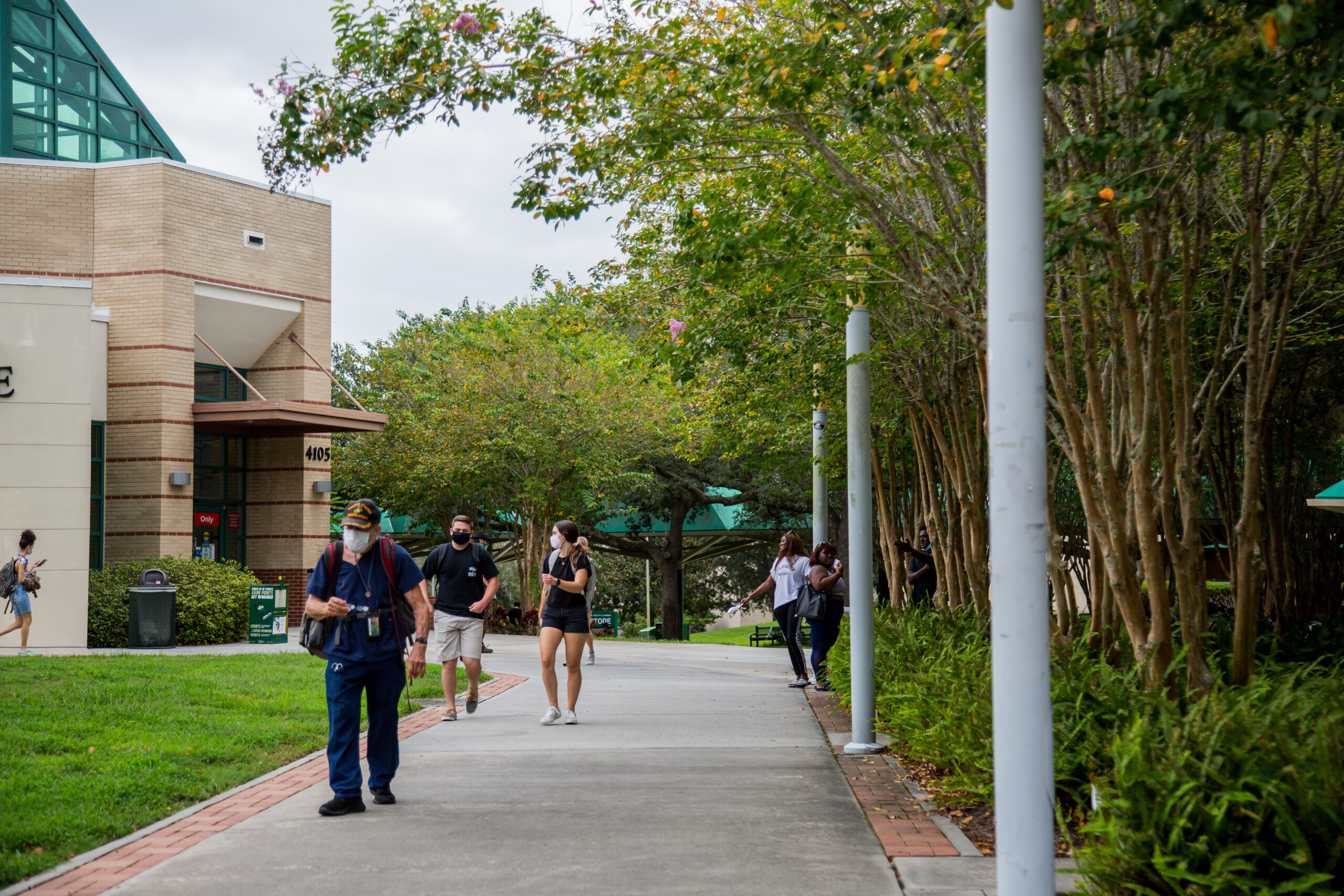
Senior nursing major Ralph Gonzalez has helped vaccinate over 700 people a day at the James A. Haley Veterans’ Hospital. Now that Gov. Ron DeSantis has designated anyone 18 and older to be eligible for a vaccine by next week, Gonzalez is excited for his peers to be vaccinated so normal operations can resume.
“I’m excited to just be able to go to large gatherings again. Choosing to stay at home and being forced to stay at home are two very different things,” Gonzalez said. “Although I’ve made a lot of online friends, it doesn’t beat seeing a group of people.”
DeSantis announced Thursday that beginning April 5, anyone 18 and older with a state-issued ID will be able to receive the COVID-19 vaccine. For students who have already received the vaccine as well as students who are hoping to get their shot soon, this was exciting news as it served as an indicator of a potential future return to normalcy as soon as the summer begins.
Getting the COVID-19 vaccine will allow students like junior English major Moss Cantrell to do the activities they took for granted before the pandemic began. She said she never knew how much she enjoyed some of the simple activities she participated in during her everyday life.
“Honestly, I can’t wait to go out to eat again. I know places are technically open, but I won’t be going until it’s actually safe to do so,” she said.
“The thought of going out to eat and then going to a movie, something that seemed so normal before, is one of the things I am most excited about overall. I’ll definitely be more cautious about my health and those around me once I’m vaccinated, but I’m hoping my anxiety won’t be as bad.”
She said she will still follow Centers for Disease Control and Prevention (CDC) guidelines and isolate for the safety of others, but she won’t be as scared of contracting the virus or putting others at risk once she is vaccinated.
“I want the vaccine to keep myself and my loved ones safe, as well as to keep others safe and to help get to a point where it’s safe to exist in the real world again without so much fear,” Cantrell said. “I also live with people who don’t intend to be vaccinated despite being in contact with people regularly, so it gives me some peace of mind.”
One of the primary impacts of receiving the vaccine, according to Cantrell, will be the ability to resume a traditional student life at USF.
“Once I’m vaccinated I think I might consider in-person classes again. I’ve been off campus taking online classes since the school was first shut down, and while I’m fine with online stuff I do miss being on campus some,” she said.
USF administration announced its plans to resume in-person activity by Summer B through a universitywide email from USF President Steven Currall on March 3. A full return to campus is contingent on achieving what USF administration describes as “phase IV,” which is characterized by the CDC lifting social distancing guidelines and herd immunity being achieved by vaccinating at least 95% of the U.S. population.
Though the immediacy of Currall’s planned return to in-person instruction was initially met with some cynicism based on the previous vaccine distribution timeline. Lydia Rufin, a junior music education major, is eager to get the vaccine so she can get back to work in person.
“As a music student, I can’t really get the true ensemble experience right now, which is an important part of our majors. Zoom choir ain’t it,” she said. “I had to buy a lot of recording equipment and instruments to be able to do my assignments at home. [Playing our instruments back to the professor] is a huge part of our curriculum, and that’s really hard to do over Zoom.
“Getting to be back in the concert halls, rehearsal spaces and face-to-face classrooms will help me gain the skills I need to develop before I begin my life as a teacher.”
Rufin is not the only student who has struggled to adapt to the virtual coursework. Mikhela Hick has had a difficult time online, and though she is excited to get the vaccine, she fears that getting used to in-person instruction again will be difficult as well.
“School online has been rough and I kind of forgot what it’s like to be enrolled in person,” she said. “It’s going to be another adjustment period in the fall going back to having a completely different schedule.”
Sarah Hamrick, a sophomore public health major, said being vaccinated will be a “weight lifted off her chest” when it comes time to return to school.
“I hope that being vaccinated will open the door to more opportunities through the school such as hospital opportunities within my public health major,” she said.
“I am also looking forward to being able to go back to in-person classes soon. I miss being in an academic setting and I think that going back to in person will help me academically because being on campus forces me to be studious.”
The relief Hamrick anticipates is not uncommon in people who are already vaccinated, according to Gonzalez. He said he has seen a variety of reactions like people beginning to cry or people cheering, after he vaccinated them in the drive-up vaccination line at the veterans’ hospital.
“There are so many reactions to it, but I think the most overarching reaction is a sense of gratitude,” he said. “We’ve kind of been living in limbo for the past 12 months and now that people are getting effective protection, it’s one step closer to getting back to normal.”
Despite some students being eager to get the vaccine when the age is lowered on April 5, others have chosen not to get vaccinated.
Jessica Thomlinson, a senior criminology major, said she has felt pressure from her peers to get the vaccine, but tries her best to ignore them because she is concerned about the unforeseen effects on her health.
“I won’t get the vaccine because its long-term impacts are not known,” she said. “This virus has been around for a little over a year and no one I know has been sick with it. I almost always have negative reactions to vaccines so I won’t be getting it.”
Autoimmune disorders influenced many students’ decisions on whether or not to get the vaccine. Carolyn McEwen, a freshman English major, is not able to get the COVID-19 vaccine because of her disorder.
“With my immune disorder I am not able to get most vaccines because my white blood cells do not work, so strengthening them does not do anything,” she said. “I was able to get the basic shots that you have to get to go to school though.”
While personal health issues have dissuaded some students from seeking the vaccine, other students have been relieved to get the vaccine because they were at higher risk of contracting coronavirus. Sophomore political science major Natalie Rubin already received the first dose of the vaccine due to her health conditions and was among the most relieved students.
“I’m chronically ill, so I was eligible [to receive the vaccine] due to my medical conditions. One of my doctors ordered me a vaccine through the hospital I see specialists at. I was so happy when I received the vaccine that I cried,” she said.
“When this pandemic began, doctors on the news were saying people [who had conditions like mine] were dying and I had a close friend with similar medical conditions who contracted the virus early on who survived by the skin of her teeth,” Rubin said.
Although she was relieved, Rubin said that her day-to-day life will not change much until more of the population becomes vaccinated.
“I don’t think receiving the vaccine will change my activities too much as of right now. I will start seeing my other vaccinated friends per the CDC guidance, but I think overall receiving this vaccine will allow me to finally breathe easily again,” she said.
Regardless of whether or not students intend to get a vaccine, the vast majority are enthusiastic about being able to see friends without the fear of contracting coronavirus.
“I’m most excited to see everyone’s smiles and to go out and interact with others again,” Hick said.

